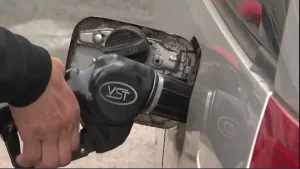More Stories
Truckers are getting an unwelcome Christmas present this year. Starting Jan. 1, they'll have to pay a new “Highway Use Fee” to drive on Connecticut's busiest roads. But compliance is voluntary, leading critics to ask if carriers will actually pay.
The new tax was news to big rig drivers at the I-95 service plaza in Darien on Wednesday.
"No, I didn't know anything about it,” said Jason Breton, a driver based in New Jersey.
The Highway Use Fee only applies to larger trucks – between Class 8 and 13, weighing more than 26,000 pounds. The tax costs anywhere from 2.5 to 18 cents per mile, depending on the truck's size. Driving the entire stretch of I-95 will cost between $2.77 and $19.43.
That’s far less than tolls at the New York City bridges and tunnels, but the trucking industry said it still adds up.
"We have a carrier up here with 25 of their trucks that are all big rigs. That would cost them approximately $150,000 a year,” said John Blair, president of the Motor Transport Association of Connecticut.
Blair questions whether some truckers will even pay the new tax, since carriers have to voluntarily report their miles to the Connecticut Department of Revenue Services each month.
"Out-of-state truckers that only maybe come through the state a couple of times a month are unlikely to pay,” said Blair. “They may not even know about the tax itself."
DRS Commissioner Mark Boughton said the agency has notified trucking companies across the nation, and several thousand drivers have already registered to pay the new fee. He said Connecticut State Police will be looking for truckers who haven't registered.
“All taxes are an honor system,” he said. “But second thing is, we have a very robust auditing department … All those trucking firms have to register nationally, so there's a national database. We've used that database, so we'll know.”
But truckers aren’t sure the tax can be enforced.
"If it's not something enforceable, like they're going to get in trouble for it – well, I'm not sure if they will, if they would comply,” said Shemiah Buggan, a Maryland-based driver.
Gov. Ned Lamont approved the Highway Use Fee last year after abandoning a deeply unpopular proposal to bring tolls to Connecticut. DRS estimates it will raise about $90 million per year for highway and bridge projects across the state. Lamont has said the revenue stream is still needed, in spite of Connecticut’s record-setting budget surplus and an influx of infrastructure dollars from Washington, because federal dollars require matching funds from the state.
When asked if all drivers could one day pay a mileage fee and not just trucks, Boughton said the idea is “light years away” – and would likely only work on a national level.
More from News 12
0:49

‘Plowsaurus Rex’ among winning names in annual snowplow contest
0:19

Several students injured following Southbury school bus crash
0:43

Gov. Lamont proposes free transit service for veterans
0:30

Pedestrian pinned under car in Bridgeport crash
0:35

Train cars with liquid petroleum being removed after Mansfield derailment
